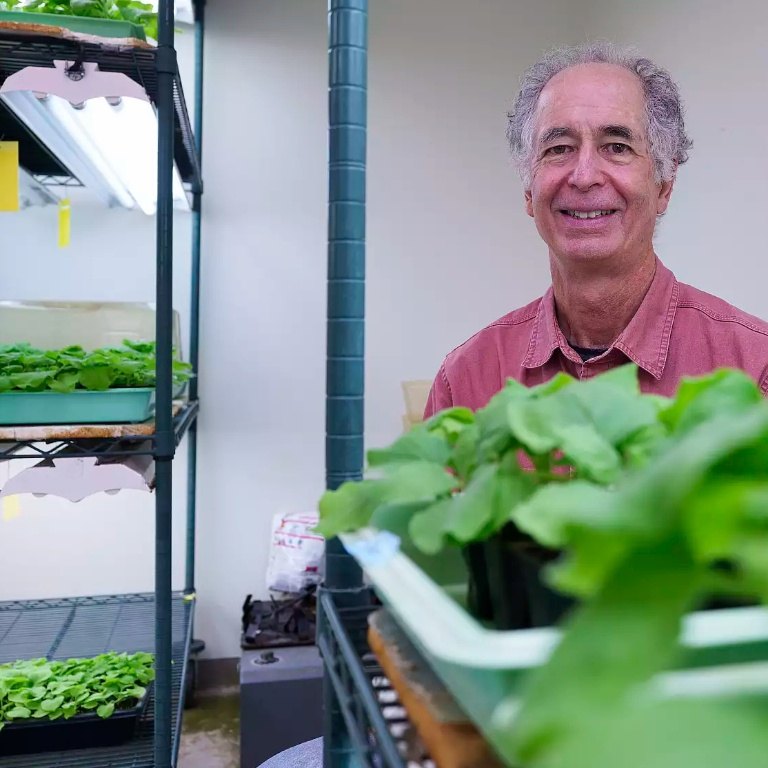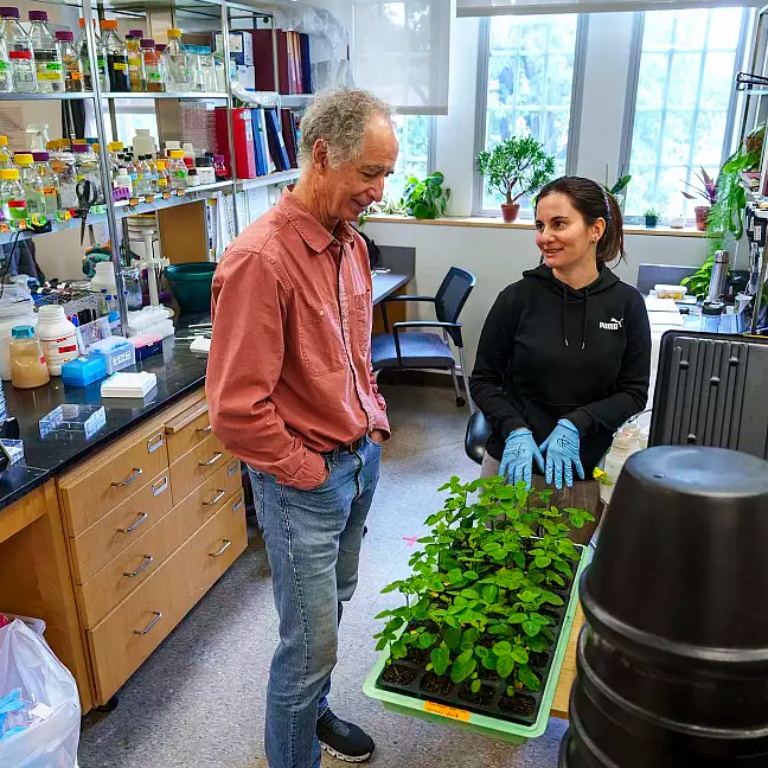“Imagine that we could return half of the Midwest to prairie. We could increase the planet’s ability to capture carbon, restore our insect populations and restore our ecosystems to a better balance,” said Roger Innes, Distinguished Professor of Biology in the College of Arts and Sciences at Indiana University.
His research into plant immune systems makes this vision possible by uncovering more sustainable ways of fighting agricultural pests and diseases that could increase yields of key crops like soybeans, while at the same time reducing overall costs for farmers.
The National Academy of Sciences has elected Innes as a member of its 2025 cohort for his “distinguished and ongoing achievements in original research.” Innes, who directs the Roger Innes Lab at IU Bloomington, is also an elected fellow of the American Association for the Advancement of Science and the American Academy of Microbiology.
Significant discoveries with widespread impact
Innes’ research centers on plant immune systems, with the goal of finding more ecologically sound ways of protecting plants from pathogens and insects.
“Our current agricultural practices are not sustainable,” he said. “The decline in insect and pollinator populations is largely a result of agriculture. Toxins from pesticides accumulate in our groundwater. It also drastically alters ecosystems. Through genetics, we think we can develop pathogen-resistant crops without having to rely on chemical inputs.”
For 30 years, Innes’ lab worked toward this goal by investigating how a plant knows whether it’s under attack. Pathogens that threaten crop health include bacteria, fungi and parasitic worms known as soybean cyst nematodes.
Agriculture experts estimate that soybean cyst nematode damage alone causes more than $1.5 billion in soybean crop losses in the United States annually. Innes’ lab, in collaboration with the Baum Lab at Iowa State University, identified a protein in soybean cyst nematodes that targets the host plant’s immune system and reduces the plant’s defenses against the infection.
“Plant immune systems work sort of like an alarm system on a house,” Innes said. “In most alarm systems, there are sensors on windows and doors that can detect when damage has been done to the house.”
Similarly, plants contain proteins that can sense damage to a cell that shouldn’t normally happen, indicating to the plant that it’s under attack. By better understanding the nematode proteins that target plant proteins, Innes’ research is paving the way for the creation of novel sensors that will trigger an effective immune response against soybean cyst nematode attacks.
These insights have the potential to extend beyond soybean cultivation.
“One of the things I think is most exciting about Roger’s work is that they’ve taken that basic knowledge of how the plant immune system works and can hack it,” said Craig Pikaard, Distinguished Professor of Biology at Indiana University. “They understand it well enough to actually engineer plants to respond to things they don’t normally respond to, including some really problematic pests.”
Pikaard said that in addition to Innes’ pioneering work in the field of synthetic biology, he also energetically advocates for the scientific study of plants. Innes is a past president of the prestigious International Society for Molecular Plant-Microbe Interactions and has served as a senior editor for The Plant Cell, a leading journal in the field of plant biology.
“If you work in plants as I do, anywhere you travel, people know Roger,” Pikaard said. “He raises the caliber of what IU is known for.”
Bridge to the future
Innes’ influence also extends into the future of science through his thoughtful mentorship of dozens of graduate students and postdoctoral fellows, many of whom have gone on to start their own research labs.
“Roger is like a sponge,” said Meenu Singla-Rastogi, one of the postdocs currently working in Innes’ lab. “He’s always open to new ideas and pursuing them with enthusiasm.”
After completing a Ph.D. in plant immunity at the Institut de Biologie de l’Ecole Normale Supérieure and Sorbonne University, Singla-Rastogi began working with Innes in 2021 and said she has thrived under his guidance.
“He’s very supportive scientifically,” Singla-Rastogi said. “He provides his students and trainees with all the tools that we need for our experiments, but he also gives us the positive energy and the time we need to discuss our work.”
Under Innes’ mentorship, Singla-Rastogi and her colleagues made another major discovery in the world of plant immune systems. Along with fellow first author Lucía Borniego, she published a study uncovering evidence that plants secrete RNA onto their leaf surfaces. RNA is the molecule that plays an important role in producing and regulating proteins in cells.
This study, on which Innes is the corresponding author, found that RNA on the surface of plants functions in much the same way as RNA in the human gut might. By regulating which bacteria can and cannot thrive, the RNA contributes to the maintenance of a healthy microbiome more capable of fighting off infection. Not only is this discovery important to the study of plant immunity; it could also be key to a better understanding of animal and human immune systems.
Singla-Rastogi said that her work in Innes’ lab marks an early step in what she hopes is a long stretch of world-changing scientific inquiry with her colleagues.
“Roger doesn’t just get scientific satisfaction from his own research; he gives his students the resources to go on and build independent research groups,” Singla-Rastogi said. “He has built a bridge so that 30 years down the line, I can see myself still working on these ideas.”
Written by IU Storyteller Christiane Wisehart for News at IU.


 The College of Arts
The College of Arts